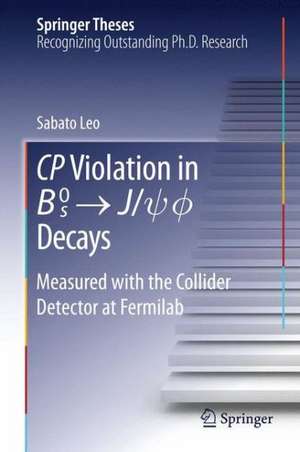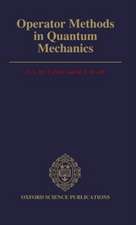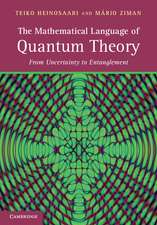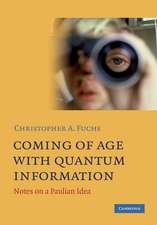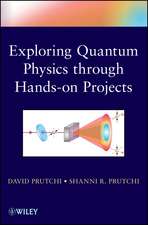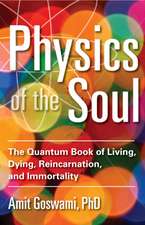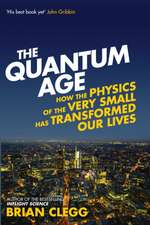CP Violation in {B_s}^0 -> J/psi.phi Decays: Measured with the Collider Detector at Fermilab: Springer Theses
Autor Sabato Leoen Limba Engleză Hardback – 7 aug 2014
| Toate formatele și edițiile | Preț | Express |
|---|---|---|
| Paperback (1) | 633.35 lei 6-8 săpt. | |
| Springer International Publishing – 17 sep 2016 | 633.35 lei 6-8 săpt. | |
| Hardback (1) | 639.41 lei 6-8 săpt. | |
| Springer International Publishing – 7 aug 2014 | 639.41 lei 6-8 săpt. |
Din seria Springer Theses
- 18%
 Preț: 997.88 lei
Preț: 997.88 lei -
 Preț: 389.88 lei
Preț: 389.88 lei - 15%
 Preț: 646.94 lei
Preț: 646.94 lei - 18%
 Preț: 943.43 lei
Preț: 943.43 lei -
 Preț: 399.29 lei
Preț: 399.29 lei - 18%
 Preț: 944.99 lei
Preț: 944.99 lei - 15%
 Preț: 636.80 lei
Preț: 636.80 lei - 18%
 Preț: 941.05 lei
Preț: 941.05 lei - 15%
 Preț: 643.16 lei
Preț: 643.16 lei - 15%
 Preț: 642.68 lei
Preț: 642.68 lei - 18%
 Preț: 1103.62 lei
Preț: 1103.62 lei - 20%
 Preț: 558.83 lei
Preț: 558.83 lei - 18%
 Preț: 1112.30 lei
Preț: 1112.30 lei - 18%
 Preț: 944.19 lei
Preț: 944.19 lei - 18%
 Preț: 1109.92 lei
Preț: 1109.92 lei - 18%
 Preț: 1217.27 lei
Preț: 1217.27 lei - 15%
 Preț: 640.06 lei
Preț: 640.06 lei - 15%
 Preț: 636.45 lei
Preț: 636.45 lei - 15%
 Preț: 640.06 lei
Preț: 640.06 lei - 15%
 Preț: 640.88 lei
Preț: 640.88 lei -
 Preț: 389.70 lei
Preț: 389.70 lei - 20%
 Preț: 563.91 lei
Preț: 563.91 lei -
 Preț: 393.35 lei
Preț: 393.35 lei - 15%
 Preț: 637.93 lei
Preț: 637.93 lei - 15%
 Preț: 641.85 lei
Preț: 641.85 lei - 18%
 Preț: 1225.94 lei
Preț: 1225.94 lei - 20%
 Preț: 551.36 lei
Preț: 551.36 lei - 18%
 Preț: 1229.10 lei
Preț: 1229.10 lei - 15%
 Preț: 639.25 lei
Preț: 639.25 lei - 18%
 Preț: 999.45 lei
Preț: 999.45 lei - 15%
 Preț: 640.06 lei
Preț: 640.06 lei - 18%
 Preț: 1220.45 lei
Preț: 1220.45 lei - 18%
 Preț: 1116.26 lei
Preț: 1116.26 lei - 18%
 Preț: 1110.72 lei
Preț: 1110.72 lei - 18%
 Preț: 1000.87 lei
Preț: 1000.87 lei - 18%
 Preț: 891.17 lei
Preț: 891.17 lei - 15%
 Preț: 640.06 lei
Preț: 640.06 lei - 5%
 Preț: 1154.07 lei
Preț: 1154.07 lei - 15%
 Preț: 635.96 lei
Preț: 635.96 lei - 15%
 Preț: 640.88 lei
Preț: 640.88 lei -
 Preț: 387.20 lei
Preț: 387.20 lei - 18%
 Preț: 1109.92 lei
Preț: 1109.92 lei -
 Preț: 385.25 lei
Preț: 385.25 lei -
 Preț: 385.25 lei
Preț: 385.25 lei - 18%
 Preț: 1112.30 lei
Preț: 1112.30 lei - 18%
 Preț: 999.45 lei
Preț: 999.45 lei -
 Preț: 386.99 lei
Preț: 386.99 lei - 15%
 Preț: 637.13 lei
Preț: 637.13 lei - 20%
 Preț: 554.21 lei
Preț: 554.21 lei - 20%
 Preț: 555.59 lei
Preț: 555.59 lei
Preț: 639.41 lei
Preț vechi: 752.24 lei
-15% Nou
Puncte Express: 959
Preț estimativ în valută:
122.35€ • 127.75$ • 101.03£
122.35€ • 127.75$ • 101.03£
Carte tipărită la comandă
Livrare economică 16-30 aprilie
Preluare comenzi: 021 569.72.76
Specificații
ISBN-13: 9783319079288
ISBN-10: 331907928X
Pagini: 150
Ilustrații: XIII, 137 p. 69 illus., 22 illus. in color.
Dimensiuni: 155 x 235 x 15 mm
Greutate: 0.39 kg
Ediția:2015
Editura: Springer International Publishing
Colecția Springer
Seria Springer Theses
Locul publicării:Cham, Switzerland
ISBN-10: 331907928X
Pagini: 150
Ilustrații: XIII, 137 p. 69 illus., 22 illus. in color.
Dimensiuni: 155 x 235 x 15 mm
Greutate: 0.39 kg
Ediția:2015
Editura: Springer International Publishing
Colecția Springer
Seria Springer Theses
Locul publicării:Cham, Switzerland
Public țintă
ResearchCuprins
Introduction.- Flavor as a Probe for non-SM Physics.- The Collider Detector at the Fermilab Tevatron.- Analysis Selection.- Preparation of Tools.- The Fit to the Time Evolution.- Systematic Uncertainties.- Results.- Conclusion.
Notă biografică
Leo Sabato obtained his PhD at University of Pisa in 2013. In 2008 he joined the Collider Detector Facility experiment, located in Batavia (ILLINOIS), 35 miles far from Chicago. In July 2012 I relocated to CERN, Switzerland, where he worked for about a year at the LHCb experiment within the HLT trigger group. Currently, as of April 2014, he is a Post Doctoral Research Associate at University of Illinois at Urbana-Champaign. The focus of his research is the new G-2 experiment at Fermilab, where he continues to be involved in CDF analysis.
Textul de pe ultima copertă
This thesis reports on the final measurement of the flavor-mixing phase in decays of strange-bottom mesons (B_s) into J/psi and phi mesons performed in high-energy proton-antiproton collisions recorded by the Collider Experiment at Fermilab.Interference occurs between direct decays and decays following virtual particle-antiparticle transitions (B_s-antiB_s). The phase difference between transition amplitudes (“mixing phase”) is observable and extremely sensitive to contributions from non-standard-model particles or interactions that may be very hard to detect otherwise – a fact that makes the precise measurement of the B_s mixing phase one of the most important goals of particle physics.The results presented include a precise determination of the mixing phase and a suite of other important supplementary results. All measurements are among the most precise available from a single experiment and provide significantly improved constraints on the phenomenology of new particles and interactions.
Caracteristici
Nominated as an outstanding Ph.D. thesis by the University of Pisa, Italy Complete and detailed description of one of the most complicated analyses in the search for new physics in the quark flavor sector Introduction provides a modern theoretical overview and discusses fundamental experimental aspects Gives up-to-date comparison of sensitivity and performances of different experiments A special chapter summarizes the latest status of the search for new physics in quark flavor sector Includes supplementary material: sn.pub/extras
